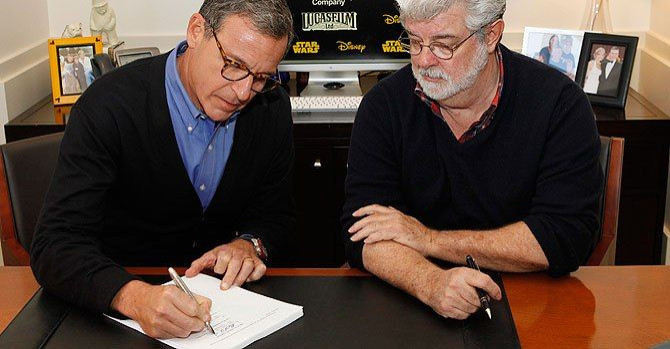Star Wars 7: The Dark Side Of Disney’s Deal With Lucasfilm

Not that long ago in our very own galaxy, Robert A. Iger took over as chief executive of the Walt Disney Company (NYSE: DIS), ushering in an era of acquisitions for the media giant that includes such family-friendly brands as Pixar and Marvel Entertainment.
But even if Iger’s resume wasn’t in any particular need of padding, Tuesday’s announcement that Disney will purchase George Lucas’s Lucasfilm for $4.05 billion has forever set his legacy in stone -- or space. The deal came with much-anticipated news that Disney will release three more “Star Wars” feature films beginning in 2015, allaying fans’ long-held fears that the franchise would die with Lucas, who just this year told the New York Times that he has no intention of directing another “Star Wars” film.
Despite that bold proclamation, Lucas said in a statement Tuesday that the Disney deal will allow him to pass the franchise on to a “new generation” of filmmakers. “I’ve always believed that ‘Star Wars’ could live beyond me, and I thought it was important to set up the transition during my lifetime,” he added.
But like any worldwide staple of pop culture, the “Star Wars” universe comes equipped with a passionate and often polarized fan base, at least half of which seemed to react to Tuesday’s announcement as if it were a serious disturbance in the force.
Seth MacFarlane, creator of “Family Guy” and pop-culture aesthete, wasted no time joking about undesirable possibilities of “Star Wars” in the hands of the house that Mickey built. “Looking forward to seeing what exciting new Star Wars adventures will be cooked up by the dream factory that brought us Mars Needs Moms!,” he tweeted.
The comedian James Capria made a similar observation, tweeting, “Now that Disney is involved, I can’t wait for the future Star Wars soundtracks filled with Celine Dion songs.”
Across Twitter, other fans worried that Disney’s outstretched influence would smother Lucas’s personal touch, as did fans interviewed by some news outlets. “Disney owns too much already,” complained one fan, according to BBC News.
Despite such dissention, Disney’s track record of re-launching movie franchises contains no shortage of commercial success stories. Last year’s “The Muppets,” one of the surprise hits of the summer, appeased many skeptics who had assumed the worst when Disney purchased the rights to Jim Henson’s beloved characters in 2004. The movie succeeded, as many critics noted, largely by resisting Disneyfication and instead staying true to the late Henson’s folksy sensibilities -- an aesthetic Disney is not necessarily known for.
With the upcoming three “Star Wars” releases, Disney will encounter a similar challenge, one compounded by the fact that the Lucasfilm purchase includes original story treatments written by George Lucas, who will serve as a consultant on the films. Indeed, while many Twitter fans voiced concerns over “Star Wars” in the hands of Disney, an equal number had pointed out that Lucas’s much-maligned prequels had already done the franchise more harm than Disney ever could.
“Yes, Disney bought Lucasfilm for 4 bil,” tweeted Comedy Central’s Wayne Gladstone. “But I like to think of it as the world contributing 50 cents each to get Star Wars away from Lucas.”
Of course, rising above all of the snide comments and harsh complaints on Tuesday was a salvo of elated chatter from fans who were simply excited that the franchise would continue -- even if it turns out that the biggest threat to Lucas’s legacy is not Bob Iger, but Lucas himself.
© Copyright IBTimes 2025. All rights reserved.





















